| 1000 BC
| Nebjoth is the first-born of Ishmael (Gen. 24:13) |
| 700 BC |
Isaiah mentions the people of Saba, and the people of Nebaioth, (Isaiah 60:1-7) |
| 627 BC |
Nabate, found in seventh-century B.C. Assyrian sources |
| 586 BC |
Nebuchadnezzar captures Jerusalem and the Jewish people sent to exile. Tribes of Arabia start to move northward into the empty land. |
| 552 BC |
Nabonidus (Persian Empire) removes Edomite monarchy |
| 332 BC |
Alexander the Great conquers Syria and Palestine |
| 323 BC |
Alexander the Great dies |
| 312 BC |
Nabataeans mentioned by historian Diodorus |
| 312 BC |
Antigonus, the Seleucid ruler of Syria twice attempts to attack and plunder the Nabataeans living in Edom. The Nabataeans chose to buy off Antigonus with costly gifts, a pattern they would use in the future when dealing with invaders |
| 198 BC |
Antiochus II victorious over Ptolemy III |
| 169 BC |
Aretas I, "Tyrant of the Arabs" and "King of the Nabatu" is mentioned in II Maccabees 5:8. During this time the Nabataeans were beginning to expand their domain from Biblical Edom into Moab |
| 145 BC |
Josephus (Antiquities XIII 131) mentions a Nabataean King Malichus reigning abut 145 B.C. but there is no other supporting evidence for this |
| 120 BC |
Aretas II, "Erotimus, King of the Arabs," is mentioned in connection with the siege of Gaza (c. 96 B.C.) by Alexander Jannaeus (103-76 B.C.). The city appealed to Aretas for help but it arrives too late |
| 90 BC |
Obodas I, "King of the Arabs," was the son of Aretas II |
| 93 BC |
Obodas defeated Alexander Jannaeus and gained control of the Hauran and Jebal Druze |
| 87 BC |
Rabbel I, another son of Aretas II, he reigned for less than a year. Antiochus XII Dionysus of Damascus (87-84 B.C.) set out to fight the Nabataeans. Rabbel fell in battle but the Kingdom was saved |
| 87 BC |
Aretas III, "Philhellene," becomes leader and conquers northern Transjordan and southern Syria |
| 85 B.C |
Aretas II becomes ruler of Damascus at the request of its inhabitants. The Nabataeans now contol both the maritime trade routes to India and the Middle Eastern link of the Silk Road. |
| 64 BC |
Pompey conquers Syria and makes it a Roman province |
| 62 BC |
Pompey's general Scaurus devastated the area around Petra but could not take the city. The Nabataeans apparently buy their freedom by paying tribute |
| 62 BC |
Malichus I becomes ruler |
| 48 BC |
Malichus I sends camel cavalry to help Caesar in Egypt |
| 30 BC |
Obodas III becomes ruler. Later he is known as "The Divine Obodas" or "Zeus-Obodas" after his death. Obodas, is overshadowed by his chief minister, Syllaeus |
| 26 BC |
The failed expedition by Aelius Gallus into Southern Arabia with Syllaeus as his guide. |
| 5 BC |
Syllaeus executed in Rome. Obodas was buried in Oboda, the town in the Negev named after him. Obodas was deified and an impressive temple was raised in his honor at Oboda. His cult persisted until the third century |
| 9 BC |
Aretas IV made leader. He is known as "Philopatris," and was called "the King of the Nabatu, who loves his people." During his reign, the Nabataean Kingdom reached its zenith. He was in control of Damascus when his Ethnarch tried to arrest the Apostle Paul |
| 40 AD |
Malichus II, who was the first-born son of Aretas IV |
| 67 AD |
Malichus sends an army to help Vespacian in the siege of Jerusalem. Malichus lost control of Damascus but retained the territory to the east and southeast of it. Nomadic tribes from Arabia began attacking the southern parts of the Kingdom, penetrating into the Negev where they destroyed Oboda and forts on the Petra-Gaza road |
| 70 AD |
Rabbel II is leader. He is known as "He who gives life and salvation to his people." The earliest inscription with this title is dates AD 88 and comes from Oboda and is connected with agriculture. This may indicate that he earned this title by subjugating the Arab tribes and laying the basis for dry farming and horse raising. Like his father, Rabbel spent much time in Bostra in Nabataean Syria |
| 106 AD |
The Roman Legate of Syria, A. Cornelius Palma, on behalf of Emperor Trajan, annexed Nabataea and incorporated it into the Roman Empire as Provincia Arabia |
| 114 AD |
Via Nova Traiana road completed between Bostra and Aila |
| 130 AD |
Emperor Hadrian visits Nabataea |
| 272 AD |
Fall of Palmyra |
| 363 AD |
Earthquake levels much of Petra |
| 390 AD |
Many Nabataeans in the Negev convert to Christianity |
| 423 AD |
Some Nabataeans in Petra convert to Christianity |
| 551 AD |
Earthquake damages Petra and cities in Negev |
| 570 AD |
Abraha expands from Yemen to Medina, attacks Ka'ba. This is the year that Muhammad is born. |
| 595 AD |
Muhammad marries Khadija, he is 25 years old |
| 605 AD |
Rebuilding of the Ka'ba, Muhammd chosen to place the Black Rock |
| 610 AD |
First revelation to Muhammad in the cave |
| 614 AD |
First migration to Abyssinia |
| 616 AD |
Second migration to Abyssinia, Sib Abi Talib boycott |
| 619 AD |
boycott lifted, Year of Sorrow, Abu Talif and Khadija die |
| 620 AD |
First Pledge of Aqaba |
| 622 AD |
Hijra, Migration to Mecca |
| 623 AD |
Muhammad changes the Qibla to Masjid alHaram |
| 624 AD |
Battle of Badr |
| 625 AD |
Battle of Uhud |
| 627 AD |
Battle of the Trench |
| 628 AD |
Treaty of Hudaybiyya |
| 629 AD |
Battle of Mu'ta, Petra, Ta'if, Tabuk |
| 632 AD |
Farewell pilgrimage, death of Muhammad |
| 747 AD |
Major earthquake destroys much of what is left of Nabataean cities |
| 900 AD |
Final reference to Nabataeans in Islamic literature |








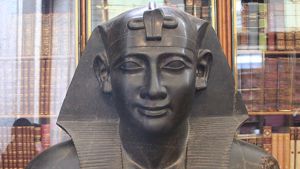
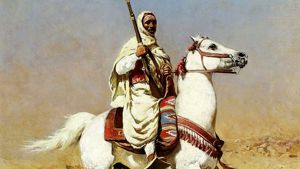

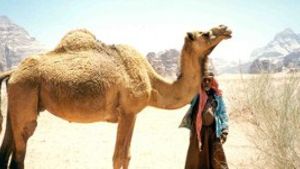
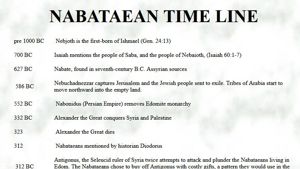
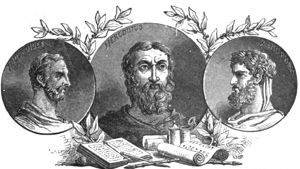


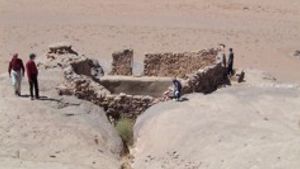
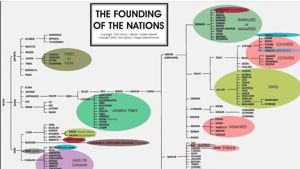
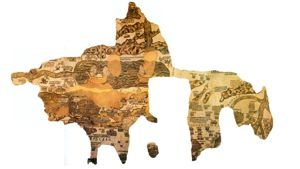
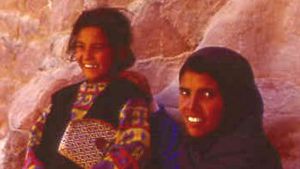
Page Discussion
Membership is required to comment. Membership is free of charge and available to everyone over the age of 16. Just click SignUp, or make a comment below. You will need a user name and a password. The system will automatically send a code to your email address. It should arrive in a few minutes. Enter the code, and you are finished.
Members who post adverts or use inappropriate language or make disrespectful comments will have their membership removed and be barred from the site. By becoming a member you agree to our Terms of Use and our Privacy, Cookies & Ad Policies. Remember that we will never, under any circumstances, sell or give your email address or private information to anyone unless required by law. Please keep your comments on topic. Thanks!